- Home
- George MacDonald
Lilith: A Romance
Lilith: A Romance Read online
Produced by John Bechard
LILITH
By George MacDonald
I took a walk on Spaulding's Farm the other afternoon. I saw the settingsun lighting up the opposite side of a stately pine wood. Its goldenrays straggled into the aisles of the wood as into some noble hall. Iwas impressed as if some ancient and altogether admirable and shiningfamily had settled there in that part of the land called Concord,unknown to me,--to whom the sun was servant,--who had not gone intosociety in the village,--who had not been called on. I saw theirpark, their pleasure-ground, beyond through the wood, in Spaulding'scranberry-meadow. The pines furnished them with gables as they grew.Their house was not obvious to vision; their trees grew through it. Ido not know whether I heard the sounds of a suppressed hilarity or not.They seemed to recline on the sunbeams. They have sons and daughters.They are quite well. The farmer's cart-path, which leads directlythrough their hall, does not in the least put them out,--as the muddybottom of a pool is sometimes seen through the reflected skies.They never heard of Spaulding, and do not know that he is theirneighbor,--notwithstanding I heard him whistle as he drove his teamthrough the house. Nothing can equal the serenity of their lives. Theircoat of arms is simply a lichen. I saw it painted on the pines and oaks.Their attics were in the tops of the trees. They are of no politics.There was no noise of labor. I did not perceive that they were weavingor spinning. Yet I did detect, when the wind lulled and hearing was doneaway, the finest imaginable sweet musical hum,--as of a distant hive inMay, which perchance was the sound of their thinking. They had no idlethoughts, and no one without could see their work, for their industrywas not as in knots and excrescences embayed.
But I find it difficult to remember them. They fade irrevocably outof my mind even now while I speak and endeavor to recall them, andrecollect myself. It is only after a long and serious effort torecollect my best thoughts that I become again aware of theircohabitancy. If it were not for such families as this, I think I shouldmove out of Concord.
Thoreau: "WALKING."
CHAPTER I. THE LIBRARY
I had just finished my studies at Oxford, and was taking a brief holidayfrom work before assuming definitely the management of the estate. Myfather died when I was yet a child; my mother followed him within ayear; and I was nearly as much alone in the world as a man might findhimself.
I had made little acquaintance with the history of my ancestors. Almostthe only thing I knew concerning them was, that a notable number of themhad been given to study. I had myself so far inherited the tendency asto devote a good deal of my time, though, I confess, after a somewhatdesultory fashion, to the physical sciences. It was chiefly the wonderthey woke that drew me. I was constantly seeing, and on the outlook tosee, strange analogies, not only between the facts of different sciencesof the same order, or between physical and metaphysical facts, butbetween physical hypotheses and suggestions glimmering out of themetaphysical dreams into which I was in the habit of falling. I was atthe same time much given to a premature indulgence of the impulse toturn hypothesis into theory. Of my mental peculiarities there is nooccasion to say more.
The house as well as the family was of some antiquity, but nodescription of it is necessary to the understanding of my narrative.It contained a fine library, whose growth began before the inventionof printing, and had continued to my own time, greatly influenced, ofcourse, by changes of taste and pursuit. Nothing surely can more impressupon a man the transitory nature of possession than his succeeding toan ancient property! Like a moving panorama mine has passed from beforemany eyes, and is now slowly flitting from before my own.
The library, although duly considered in many alterations of the houseand additions to it, had nevertheless, like an encroaching state,absorbed one room after another until it occupied the greater part ofthe ground floor. Its chief room was large, and the walls of it werecovered with books almost to the ceiling; the rooms into which itoverflowed were of various sizes and shapes, and communicated in modesas various--by doors, by open arches, by short passages, by steps up andsteps down.
In the great room I mainly spent my time, reading books of science,old as well as new; for the history of the human mind in relation tosupposed knowledge was what most of all interested me. Ptolemy, Dante,the two Bacons, and Boyle were even more to me than Darwin or Maxwell,as so much nearer the vanished van breaking into the dark of ignorance.
In the evening of a gloomy day of August I was sitting in my usualplace, my back to one of the windows, reading. It had rained the greaterpart of the morning and afternoon, but just as the sun was setting, theclouds parted in front of him, and he shone into the room. I rose andlooked out of the window. In the centre of the great lawn the featheringtop of the fountain column was filled with his red glory. I turned toresume my seat, when my eye was caught by the same glory on the onepicture in the room--a portrait, in a sort of niche or little shrinesunk for it in the expanse of book-filled shelves. I knew it as thelikeness of one of my ancestors, but had never even wondered why it hungthere alone, and not in the gallery, or one of the great rooms, amongthe other family portraits. The direct sunlight brought out the paintingwonderfully; for the first time I seemed to see it, and for the firsttime it seemed to respond to my look. With my eyes full of the lightreflected from it, something, I cannot tell what, made me turn and casta glance to the farther end of the room, when I saw, or seemed to see,a tall figure reaching up a hand to a bookshelf. The next instant, myvision apparently rectified by the comparative dusk, I saw no one,and concluded that my optic nerves had been momentarily affected fromwithin.
I resumed my reading, and would doubtless have forgotten the vague,evanescent impression, had it not been that, having occasion a momentafter to consult a certain volume, I found but a gap in the row where itought to have stood, and the same instant remembered that just there Ihad seen, or fancied I saw, the old man in search of a book. I lookedall about the spot but in vain. The next morning, however, there itwas, just where I had thought to find it! I knew of no one in the houselikely to be interested in such a book.
Three days after, another and yet odder thing took place.
In one of the walls was the low, narrow door of a closet, containingsome of the oldest and rarest of the books. It was a very thick door,with a projecting frame, and it had been the fancy of some ancestor tocross it with shallow shelves, filled with book-backs only. The harmlesstrick may be excused by the fact that the titles on the sham backswere either humorously original, or those of books lost beyond hope ofrecovery. I had a great liking for the masked door.
To complete the illusion of it, some inventive workman apparently hadshoved in, on the top of one of the rows, a part of a volume thin enoughto lie between it and the bottom of the next shelf: he had cut awaydiagonally a considerable portion, and fixed the remnant with one ofits open corners projecting beyond the book-backs. The binding of themutilated volume was limp vellum, and one could open the corner farenough to see that it was manuscript upon parchment.
Happening, as I sat reading, to raise my eyes from the page, my glancefell upon this door, and at once I saw that the book described, ifbook it may be called, was gone. Angrier than any worth I knew in itjustified, I rang the bell, and the butler appeared. When I asked him ifhe knew what had befallen it, he turned pale, and assured me he did not.I could less easily doubt his word than my own eyes, for he had been allhis life in the family, and a more faithful servant never lived. He lefton me the impression, nevertheless, that he could have said somethingmore.
In the afternoon I was again reading in the library, and coming to apoint which demanded reflection, I lowered the book and let my eyes gowandering. The same moment I saw the back of a slender old man, in along, dark coat, shiny as from much wear, in th
e act of disappearingthrough the masked door into the closet beyond. I darted across theroom, found the door shut, pulled it open, looked into the closet,which had no other issue, and, seeing nobody, concluded, not withoutuneasiness, that I had had a recurrence of my former illusion, and satdown again to my reading.
Naturally, however, I could not help feeling a little nervous, andpresently glancing up to assure myself that I was indeed alone,started again to my feet, and ran to the masked door--for there wasthe mutilated volume in its place! I laid hold of it and pulled: it wasfirmly fixed as usual!
I was now utterly bewildered. I rang the bell; the butler came; I toldhim all I had seen, and he told me all he knew.
He had hoped, he said, that the old gentleman was going to be forgotten;it was well no one but myself had seen him. He had heard a good dealabout him when first he served in the house, but by degrees he hadceased to be mentioned, and he had been very careful not to allude tohim.
"The place was haunted by an old gentleman, was it?" I said.
He answered that at one time everybody believed it, but the fact that Ihad never heard of it seemed to imply that the thing had come to an endand was forgotten.
I questioned him as to what he had seen of the old gentleman.
He had never seen him, he said, although he had been in the house fromthe day my father was eight years old. My grandfather would never heara word on the matter, declaring that whoever alluded to it should bedismissed without a moment's warning: it was nothing but a pretext ofthe maids, he said, for running into the arms of the men! but old SirRalph believed in nothing he could not see or lay hold of. Not one ofthe maids ever said she had seen the apparition, but a footman had leftthe place because of it.
An ancient woman in the village had told him a legend concerning a Mr.Raven, long time librarian to "that Sir Upward whose portrait hangsthere among the books." Sir Upward was a great reader, she said--notof such books only as were wholesome for men to read, but of strange,forbidden, and evil books; and in so doing, Mr. Raven, who was probablythe devil himself, encouraged him. Suddenly they both disappeared, andSir Upward was never after seen or heard of, but Mr. Raven continued toshow himself at uncertain intervals in the library. There were some whobelieved he was not dead; but both he and the old woman held it easierto believe that a dead man might revisit the world he had left, thanthat one who went on living for hundreds of years should be a man atall.
He had never heard that Mr. Raven meddled with anything in the house,but he might perhaps consider himself privileged in regard to the books.How the old woman had learned so much about him he could not tell; butthe description she gave of him corresponded exactly with the figure Ihad just seen.
"I hope it was but a friendly call on the part of the old gentleman!" heconcluded, with a troubled smile.
I told him I had no objection to any number of visits from Mr. Raven,but it would be well he should keep to his resolution of saying nothingabout him to the servants. Then I asked him if he had ever seen themutilated volume out of its place; he answered that he never had, andhad always thought it a fixture. With that he went to it, and gave it apull: it seemed immovable.

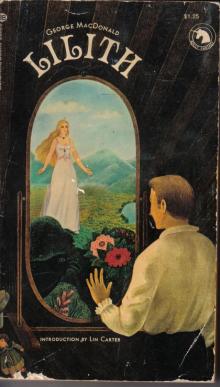 Lilith: A Romance
Lilith: A Romance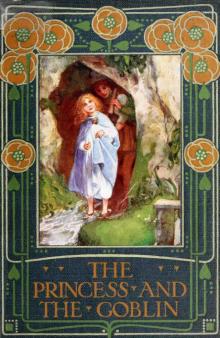 The Princess and the Goblin
The Princess and the Goblin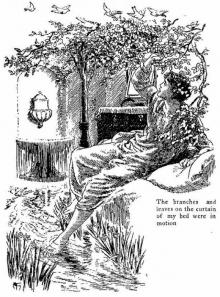 Phantastes: A Faerie Romance for Men and Women
Phantastes: A Faerie Romance for Men and Women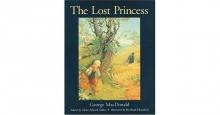 A Double Story
A Double Story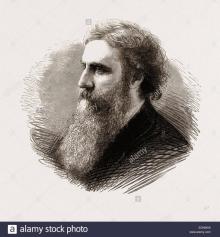 St. George and St. Michael
St. George and St. Michael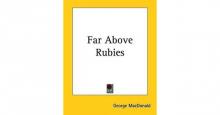 Far Above Rubies
Far Above Rubies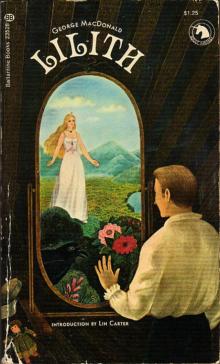 Lilith
Lilith